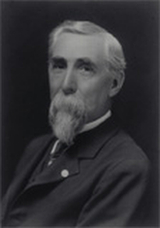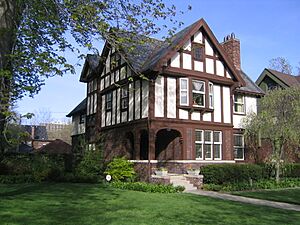Henry M. Leland facts for kids
Quick facts for kids
Henry M. Leland
|
|
|---|---|
 |
|
| Born | February 16, 1843 Vermont, U.S.
|
| Died | March 26, 1932 (aged 89) Detroit, Michigan, U.S.
|
| Known for | Founder of Cadillac and Lincoln |
| Signature | |
 |
|
Henry Martyn Leland (born February 16, 1843 – died March 26, 1932) was a very skilled American engineer and inventor. He was known for starting two famous luxury car companies: Cadillac and Lincoln.
Contents
Early Life and Skills
Henry M. Leland was born in Vermont in 1843. He was the youngest of eight children. He learned a lot about engineering and making things precisely at a factory called Brown & Sharpe in Providence, Rhode Island.
He also worked in the firearms industry, including at Colt. These jobs taught him how to make tools and parts that could be easily swapped out. This idea, called interchangeability, was very important for making things faster and cheaper.
Leland used his skills in the new car industry as early as 1870. His company, Leland & Faulconer, made engines for Ransom E. Olds's Olds Motor Vehicle Company. He also invented electric barber clippers and even made a unique toy train for a short time.
Creating Cadillac Cars
Henry Leland played a huge role in creating the Cadillac car company. Later, General Motors bought Cadillac.
In 1902, William Murphy and his partners needed someone to check their car factory. They were thinking about closing down the Henry Ford Company. Leland looked at everything and told them not to close. Instead, he suggested they build a new car using a special engine he had designed.
The company leaders quickly agreed and renamed their company Cadillac. At Cadillac, Leland used many modern ideas for making cars. One big idea was using interchangeable parts. This meant that if a part broke, you could easily replace it with a new one.
Cadillac won the Dewar Trophy in 1908 for its excellent quality. This award was given out in 1909.
Leland sold Cadillac to General Motors in 1909 for $4.5 million. He stayed on as an executive until 1917. He also helped develop the electric self-starter for Cadillac cars with Charles Kettering. This invention helped Cadillac win its second Dewar Trophy in 1913. The self-starter was very important because before it, people had to crank the engine by hand, which could be dangerous.
Leland left General Motors because he disagreed with the company's founder, William C. Durant. Durant did not want to make war supplies during World War I, but Leland felt it was important to help.
Starting Lincoln Motor Company
In 1917, Leland started the Lincoln Motor Company. They had a big contract to build V12 Liberty aircraft engines for the war. After the war ended, the company changed its focus. The factory was set up to make luxury cars instead. The V8 engine used in the first Lincoln cars was inspired by the Liberty aircraft engine.
In 1922, Lincoln ran into financial trouble and was bought by Henry Ford's Ford Motor Company. Ford offered $8 million for the company. Henry Ford had a reason for offering a lower price. He was still upset about Leland's role in starting Cadillac, which had been a rival to Ford's early company.
After the sale, Leland and his son Wilfred thought they would still be in charge of Lincoln. However, Ford sent his own people to the company. These new people were there to make production more efficient and stop the company from losing money. Soon, things became difficult between the Ford and Leland workers.
On June 10, 1922, a Ford executive named Ernest G. Liebold came to Lincoln and asked Wilfred Leland to resign. When Henry Leland realized that Liebold had Henry Ford's full support, he resigned too. That same afternoon, both men had to leave the factory they had built.
The Lincoln brand is still part of Ford's luxury car line today.
Community Involvement
Henry Leland was an important leader in Detroit's community. He was part of the Detroit Citizens League. This group believed in making society better by fighting against corrupt politicians.
The League was supported by many businesses, professionals, and religious groups in Detroit. They worked to create a new city charter in 1918. They also supported rules against saloons and promoted "open shops," where workers could get a job even if they didn't belong to a labor union.
Personal Life
Henry Leland was the son of Leander Leland and Zilpha Tifft. He married Ellen Rhoda Hull. They had three children: Martha Gertrude, Wilfred Chester, and Miriam Edith. All of their children were born in Millbury, Massachusetts.
Henry M. Leland passed away in Detroit on March 26, 1932. He is buried in Woodmere Cemetery there.
 | Selma Burke |
 | Pauline Powell Burns |
 | Frederick J. Brown |
 | Robert Blackburn |


